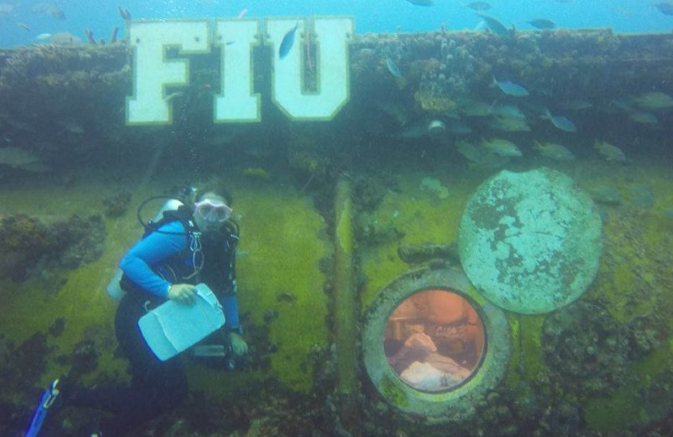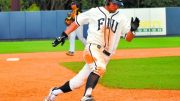Gabriela Muse / Contributing Writer
Aquarius is the only operational underwater science lab in the world, and now its FIU program offers students diving courses.
Sitting four miles south of the Florida Keys, the FIU Aquarius Reef Base conducts research on the Florida Reef tract and collects information on environmental threats that affect ocean ecosystems.
As part of FIU’s Medina Aquarius Program, the research base has launched the Advanced Training Program with educational opportunities offered both virtually for non divers and in-person for certified divers.
In collaboration with FIU’s Office of Microcredentials, Aquarius offers two diving courses open to all learners: Fundamentals of Scientific Diving as well as Introduction to Saturation Diving: Aquarius Operations and Benefit to science.
“The team themselves and the way they carried out the training was super professional and made it feel like there were real-life stakes; even the medical emergencies that we came across were treated like real-life scenarios” said Bader Al Moulah, an aspiring astronaut who took the Introduction to Scientific Diving course. Aquarius’ underwater environment has allowed it to be used as a training ground for NASA astronauts in simulating the space environment.
The advantage of the Aquarius base lies in extra time scientists have when conducting underwater research. Since the lab lies 60 feet below, the aquanauts have 10 times more downtime than they do traditionally.

Introduction to Saturation Diving is the most anticipated class on the roster, said Catherine Guinovart, the Administrative Coordinator of Aquarius.
The class opens in August 2022 and offers the first-ever opportunity for certified divers to take an in-person course at the Aquarius base while also receiving a specialty diving certificate card from Technical Diving International (TDI). An online-only course is also offered for non-certified divers.
“Just getting the competency and having the opportunity to practice those skills, it’s a lot more high stakes when dealing with saturation diving. The danger is a lot higher, the risk is higher, so getting into that level of competency, especially receiving that training from the team is something I’m looking forward to, ” said Al Moulah.
“This course has everything you need to learn about Aquarius and how it works, the history of saturation diving, the history of underwater habitats and places like Aquarius, and then also the history of Aquarius itself,” said Catherine Guinovart. “Aquarius has had a long history…and a part of what we’re trying to focus on now is really giving people the opportunity to visit Aquarius, to engage with Aquarius, to learn about Aquarius.”
Aquarius has only been under the operational control of FIU since 2013 but prior to that it was owned by NOAA and operated by the University of North Carolina Wilmington. Having been a part of scientific research for decades, the history of Aquarius taught in Introduction to Saturation Diving offers students a look into the evolution of the lab’s research and accomplishments over time.
The specialized courses offered by Aquarius, as per the FIU Institute of Environment, include Scientific Diving and Introduction to Surface-Supplied Diving for students who are already open water SCUBA certified to earn more advanced certifications. The Scientific Diving course provides a certification from the American Academy of Underwater Scientists that allows students to do research diving with any AAUS institution.
The Diving Medical Technician Course and World Extreme Medicine: Dive Medicine are courses offered for certified medical personnel to specialize in dive medicine.
“When you’re scuba diving…you’re diving from one pressure all the way down to a different pressure,” said Guinovart regarding dive medicine. “That stress of going back up to the surface after you dive that deep has a lot of effects on your body.”
The variety of courses offered, both non and for credit, offer a plethora of opportunities for students interested.






Be the first to comment on "FIU Medina Aquarius Program Courses Dive into Underwater Research"